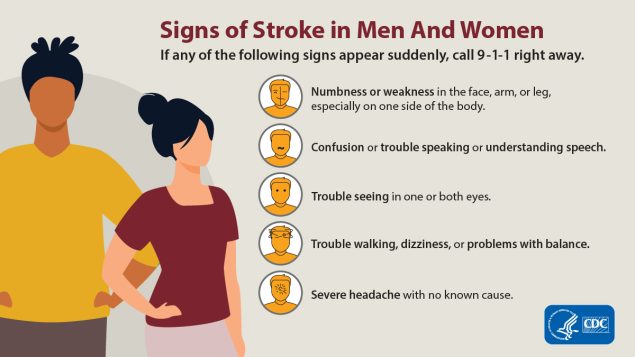Stroke Signs and Symptoms
Learn what to do if you or someone else is having a stroke.
During a stroke, every minute counts! Fast treatment can lessen the brain damage that stroke can cause.
By knowing the signs and symptoms of stroke, you can take quick action and perhaps save a life—maybe even your own.
What are the signs of stroke in men and women?
- Sudden numbness or weakness in the face, arm, or leg, especially on one side of the body.
- Sudden confusion, trouble speaking, or difficulty understanding speech.
- Sudden trouble seeing in one or both eyes.
- Sudden trouble walking, dizziness, loss of balance, or lack of coordination.
- Sudden severe headache with no known cause.
Call 9-1-1 right away if you or someone else has any of these symptoms.
Act F.A.S.T. to identify stroke
Act F.A.S.T. to help stroke patients get the treatments they need.
The stroke treatments that work best are available only if the stroke is recognized and diagnosed within 3 hours of the first symptoms. Stroke patients may not be eligible for these if they don’t arrive at the hospital in time.
If you think someone may be having a stroke, act F.A.S.T. and do the following test:
F—Face: Ask the person to smile. Does one side of the face droop?
A—Arms: Ask the person to raise both arms. Does one arm drift downward?
S—Speech: Ask the person to repeat a simple phrase. Is the speech slurred or strange?
T—Time: If you see any of these signs, call 9-1-1 right away.
Note the time when any symptoms first appear. This information helps health care providers determine the best treatment for each person.
Do not drive to the hospital or let someone else drive you. Call 9-1-1 for an ambulance so that medical personnel can begin life-saving treatment on the way to the emergency room.
What should I do to treat a transient ischemic attack (“mini-stroke”)?
If your stroke symptoms go away after a few minutes, you may have had a transient ischemic attack (TIA), also sometimes called a “mini-stroke.” Although brief, a TIA is a sign of a serious condition that will not go away without medical help.
Unfortunately, because TIAs clear up, many people ignore them. But paying attention to a TIA can save your life. If you think you or someone you know has had a TIA, tell a health care team about the symptoms right away.
More information
CDC
Other Organizations
- American Stroke Association (ASA): About Stroke
- ASA Resources in Spanish: Recursos en Español
- National, Heart, Lung, and Blood Institute: Stroke
- National Institute of Neurological Disorders and Stroke (NINDS): Stroke Information Page

